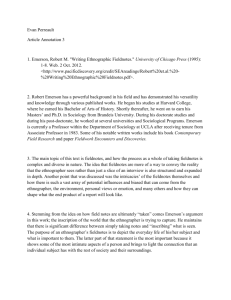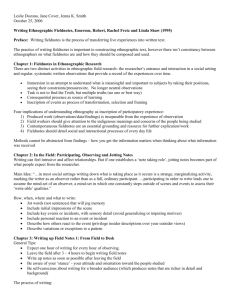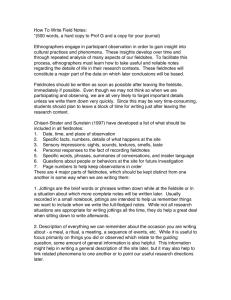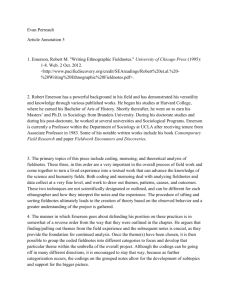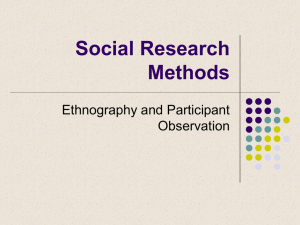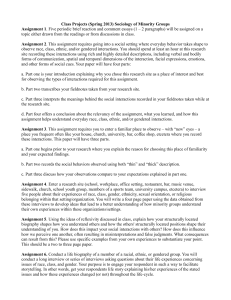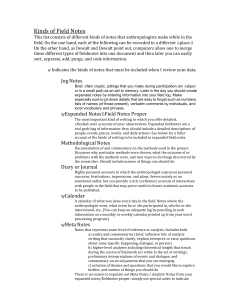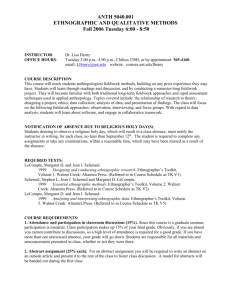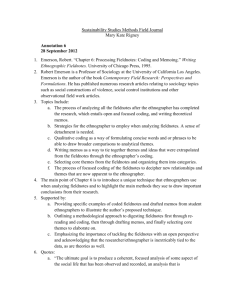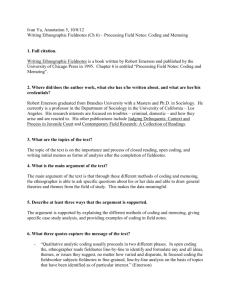Tips & Tools #21: Writing Field Notes
advertisement
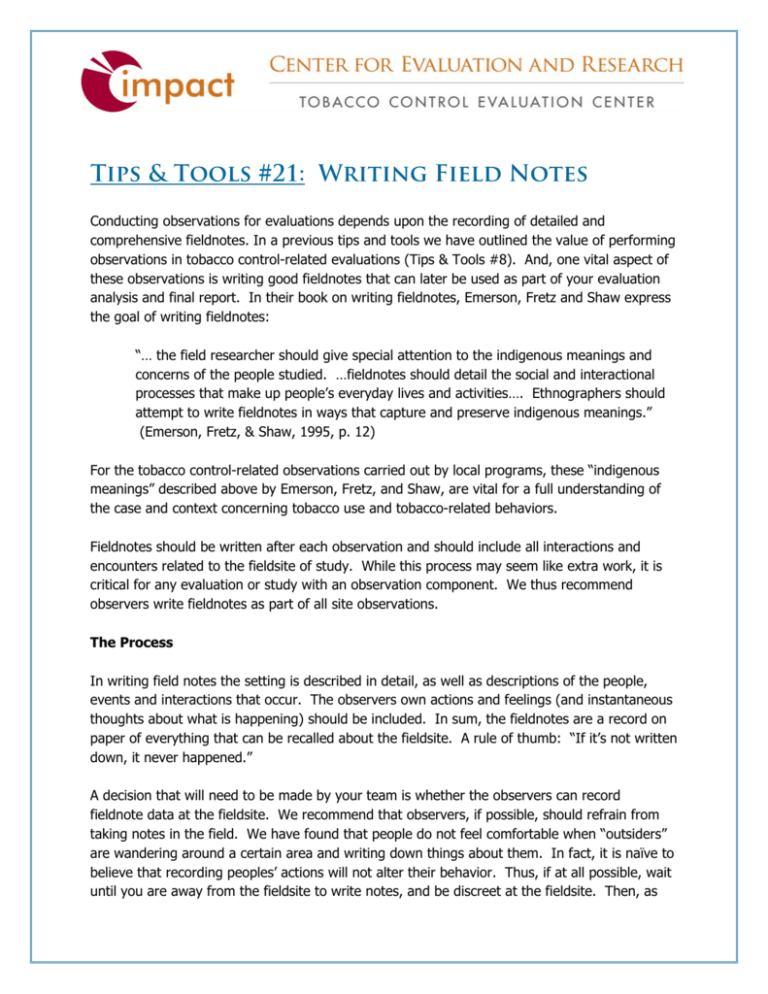
Tips & Tools #21: Writing Field Notes Conducting observations for evaluations depends upon the recording of detailed and comprehensive fieldnotes. In a previous tips and tools we have outlined the value of performing observations in tobacco control-related evaluations (Tips & Tools #8). And, one vital aspect of these observations is writing good fieldnotes that can later be used as part of your evaluation analysis and final report. In their book on writing fieldnotes, Emerson, Fretz and Shaw express the goal of writing fieldnotes: “… the field researcher should give special attention to the indigenous meanings and concerns of the people studied. …fieldnotes should detail the social and interactional processes that make up people’s everyday lives and activities…. Ethnographers should attempt to write fieldnotes in ways that capture and preserve indigenous meanings.” (Emerson, Fretz, & Shaw, 1995, p. 12) For the tobacco control-related observations carried out by local programs, these “indigenous meanings” described above by Emerson, Fretz, and Shaw, are vital for a full understanding of the case and context concerning tobacco use and tobacco-related behaviors. Fieldnotes should be written after each observation and should include all interactions and encounters related to the fieldsite of study. While this process may seem like extra work, it is critical for any evaluation or study with an observation component. We thus recommend observers write fieldnotes as part of all site observations. The Process In writing field notes the setting is described in detail, as well as descriptions of the people, events and interactions that occur. The observers own actions and feelings (and instantaneous thoughts about what is happening) should be included. In sum, the fieldnotes are a record on paper of everything that can be recalled about the fieldsite. A rule of thumb: “If it’s not written down, it never happened.” A decision that will need to be made by your team is whether the observers can record fieldnote data at the fieldsite. We recommend that observers, if possible, should refrain from taking notes in the field. We have found that people do not feel comfortable when “outsiders” are wandering around a certain area and writing down things about them. In fact, it is naïve to believe that recording peoples’ actions will not alter their behavior. Thus, if at all possible, wait until you are away from the fieldsite to write notes, and be discreet at the fieldsite. Then, as soon as possible after leaving the field, type up your fieldnotes (the sooner, the better, since one loses recall after time). Below is a list to help observers recall details in a range of settingsi. 1. Focus your attention. It is important to watch, listen and concentrate on what is happening. 2. Shift your focus from a “wide angle” to a “narrow angle” lens. If you are at a “busy” place with a lot of action, focus on a specific activity or person. Essentially, you begin with the “big picture” and then concentrate your focus on specific scenes and events. 3. Listen for key words in people’s remarks. If people are talking, you will not be able to recall full conversations. However, you can commit to memory key words or phrases, particularly those related to tobacco use. 4. Play back remarks and scenes in your head. While observing a scene or activity, consciously think about the idea that you want to remember the scene. Later, try to visualize the scene. 5. Record your fieldnotes as soon as possible after the observation. This is a repeat from above, but worth repeating. It is a simple axiom that the longer you wait to write your fieldnotes, the more you will forget. Try to schedule your observations so that you can type them up immediately after leaving the fieldsite. 6. Draw a diagram of the setting. The diagram may help you recall certain events and can be invaluable if you need to return to the site. Once you leave the site and are prepared to type of your fieldnotes, remember to include the following: A title page for all observations—the date, time, and location of your fieldwork. Specific facts and details (Who was there? How many people? What was going on? What type of smoking-related activities took place? What caught your attention? What surprised you?) Descriptions of behavior, interactions and relevant conversations. Include all tobaccorelated activity, conversations, etc. Sensory details and images (What did you see? How did it make you feel? Etc.). After the initial write-up of fieldnotes, you should also capture your impressions and interpretations of your fieldnotes. This is the ongoing data analysis that is critical for observational methods. In this manner, try and answer the following questions: What questions do you still have from your observations? What surprised you? What did you find interesting? What are your responses to the fieldnotes that you wrote? Are there aspects of the events or behavior that you would like to know more about? How does these events or behavior compare to other places or events? Observation methods can provide information that is useful as process or outcome data for evaluating many kinds of objectives, including those focused on multi-unit housing, smoke-free parks, beaches and recreational spaces, and tobacco sponsorship events. As noted, writing fieldnotes is an integral part of conducting observations. Your fieldnotes and subsequent analytic write-ups will prove to be invaluable in your evaluation of any number of tobaccorelated fieldsites. References: Emerson,R.M., Fretz, R.I. and Shaw, L.L.. (1995). Writing Ethnographic Fieldnotes. University of Chicago Press: Chicago, IL. Lofland, J. and Lofland, L.H. (1995). Analyzing Social Settings: A Guide to Qualitative Observations and Analysis. Wadsworth Publishing Company: Belmont, CA. Taylor, S.J. and Bogdan, R. (1998). Introduction to Qualitative Research Methods. Wiley and Sons: Hoboken, NJ. i This list is adapted from “Introduction to Qualitative Research Methods” by Emerson, Fretz and Shaw (1995).
